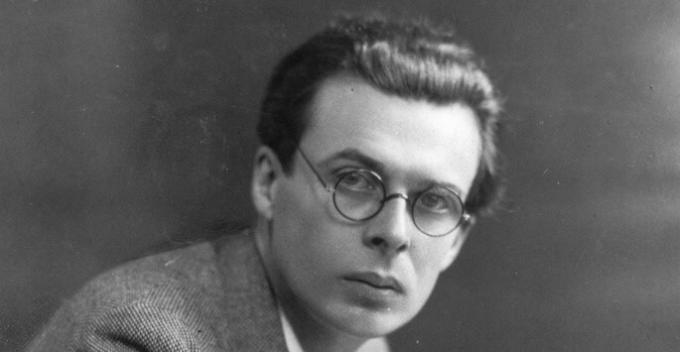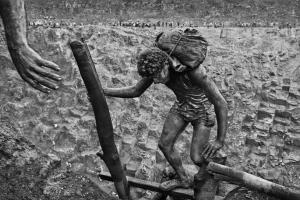Brave New World, by Aldous Huxley: summary, analysis and characters from the book
A happy world (Brave new world) is a science fiction and social criticism book written by the English Aldous Leonard Huxley (1894) in 1931 and published a year later.
It is one of the most famous dystopias of the 20th century. In it, Huxley presents a dehumanized future world in which society is divided into a caste system in which individuals are genetically created and altered.
Over the years A happy world it is still valid and is even making more and more sense. But why? What are the issues that he deals with? Let's find out what is hidden behind this timeless novel.
Summary of the novel
This novel describes a futuristic, utopian, highly regulated and technological world. It starts with a visit by a group of students to the London Incubation and Conditioning Center. There, the director of the factory explains to the young people how the population is divided, already from its incubation. Thus, according to their genetic condition, previously altered, society is divided from the Alpha to the Epsilon, from higher to lower intelligence.
In this tour, the students also learn how things were before this new world order, before a war and a great economic crisis ended up destroying it.
Later, in the second part of the book, the protagonists Bernard Marx and Lenina (allusion to Karl Marx and Lenin) visit the ‘wild reserve’, whose inhabitants are considered retrograde. There they meet John, who despite growing up among the Indians was conceived by citizens of the ‘World State’ or ‘Worldstate’, so he can read and write.
The protagonists decide to take John, the savage, to the ‘State of the world’ where the comparisons and to unmask the negative points of a seemingly perfect and happy society.
Novel analysis
A happy world describes a utopian, ironic and ambiguous world where humanity is permanently happy, where there are no wars or poverty and people are uninhibited, have a good mood, are healthy and technologically advanced.
The irony of this perfection created by the ‘World State’, the governing entity in this happy world, is the application of measures that eliminate the family, cultural diversity, art, science, literature, religion and philosophy.
The question that Aldous Huxley wants us to answer with this utopian dichotomy is very simple:
What makes us human?
The 'World State' of the happy world has as its motto: “community, identity, stability”. To astringe this ideal, the ‘World State’ strives to standardize the human product and generate love of servitude:
If persecution, liquidation, and other symptoms of social friction are to be avoided, the positive aspects of propaganda must be as effective as the negative ones. The most important Manhattan Projects of the future will be vast surveys sponsored by governments on what the politicians and the scientists who will intervene in them will call the problem of happiness; in other words, the problem of getting people to love their servitude.
The four mechanisms of the "World State"
The World State uses models or patterns in order to standardize the "human product" and, in this way, maintain utopia. These mechanisms are four:
1. Conditioning of infants
Where advanced techniques of suggestion are used from the birth of the individual as the technique of hypnopedics or education through sleep. Through which they instill in the population ideas and learnings during the different phases of sleep.
2. Scientific caste system
A highly advanced science of human differences is developed that enables leaders to of government to assign each individual the right place in a divided social and economic hierarchy on 5 classes:
- The Alphas: they are the most intelligent to this group belongs the elite They have responsibilities and are the ones who have the ability to make decisions.
- The Betas: executives belong to this caste, they are less intelligent than the previous ones and their main function is reduced to administrative tasks.
- The Gammas: They are the junior employees, whose tasks require skill.
- The Deltas: the employees of the former belong to this group.
- The Epsilons: It is the lower caste, it belongs to those employed for hard work
3. Soma
Soma is a substance used in the "World State" in order to shovel melancholic feelings, which has no side effects.
In a way, the system proposed in the book does not admit frustration or negative emotions. Soma is proposed as an immediate "solution", a drug that prevents the individual from facing problems in a "natural" way.
4. Eugenics system
This method focuses on the creation of humans from test tubes to avoid errors, eliminating unwanted genes in order to "perfect" the human species, that is, it seeks the standardization of the product human. The objective of this system is to achieve continuously satisfied individuals, for which they are genetically engineered.
Criticism of consumerism
What is the relationship between consumption and happiness? Behind this question lies the criticism that Huxley made in 1932 of the consumer society, which with the passage of time becomes even more meaningful.
Well, after all, consumption has become the engine of our century with the widespread belief that excessive consumption and continuous obtaining of material goods will make us happier.
All this excludes love, feelings or immaterial experiences that make us feel alive to give as As a result, individuals who acquire goods, are ignorant and more concerned with “sustaining” the system than with their own satisfaction individual.
Elimination of individualism
In the book the relationships and ties that characterize the human being have been completely destroyed. Likewise, individualism has been dynamited. That is, the individuals of the proposed caste society cannot act of their own free will. In this society, thought is determined by the system, the individual has lost his ability and freedom to reason.
Dehumanization
On A happy world Machines prevail over human beings, especially, they determine their development. It is precisely the machines that have made the individual lose the characteristics that make him human.
A happy world or the imposition of happiness
What does the system described in the book intend? What really is the World State?
It is a mechanized, dehumanized society in which individuals believe they are free but are nevertheless controlled and determined from their "creation". It is a system that wants to "guarantee" happiness, with expendable beings. A regime in which emotions do not fit, which are shoved with artificial substances. A dictatorship "dressed" in democracy. Isn't this system like the "perfect dictatorship" described by its author?
A perfect dictatorship would have the appearance of democracy, but it would basically be a prison without walls in which prisoners would not even dream of escaping. It would essentially be a system of slavery, in which through consumption and entertainment, slaves would love servitude.
Main characters
Bernard Marx
He is born alpha-plus with intact intellectual abilities, but due to an incubation problem he is shorter than normal. This means that he is physically outcast by his class and despised by the other castes. This rejection and social discrimination makes him a misfit who refuses to consume soma and questions the system.
Lenina Crowne
He is born beta-plus and works in the genetics lab. She is a girl who conforms to the system by taking refuge in pleasure.
John 'the savage'
Son of citizens of the ‘State of the World’ he can read and write, and is a great admirer of Shakespeare despite growing up among the indigenous people in the ‘Wild Reserve’. He is the character who creates the bridge between the past and the future, between the human and the scientific, between order and anarchy, and between stability and freedom.
Henry ford
Aldous Huxley uses the creator of the montage system Henry Ford as the god in his futuristic world to criticize this trend in today's world: "in the age of advanced technology, ineffectiveness is a sin against the Spirit Holy".
Biography and work of Aldous Huxley

He was an English writer, poet and philosopher in the bosom of an important family of intellectuals. From a very young age he began to suffer serious problems that affected his vision.
Huxley graduated in English literature from Oxford. After finishing his studies, he made different trips through Europe as an art and literature critic.
His first creations were poetry books, later he began to write his first novels. It was not until 1932 that he published his most famous work A happy world.
Then he makes a trip that will take him to visit some countries in Central America. This trip results in his work Beyond the Gulf of Mexico (1934).
He later he returns to France, where he begins a mystical stage, of which books such as Blind in Gaza (1936).
In 1937 he moved to the United States, where he resided until his death in 1963. Among the most important works of the author are:
- Counterpoint (1928)
- A happy world (1932)
- Blind in Gaza (1936)
- The doors of the perception (1954)
- The genie and the goddess (1955)
- The island (1962)



